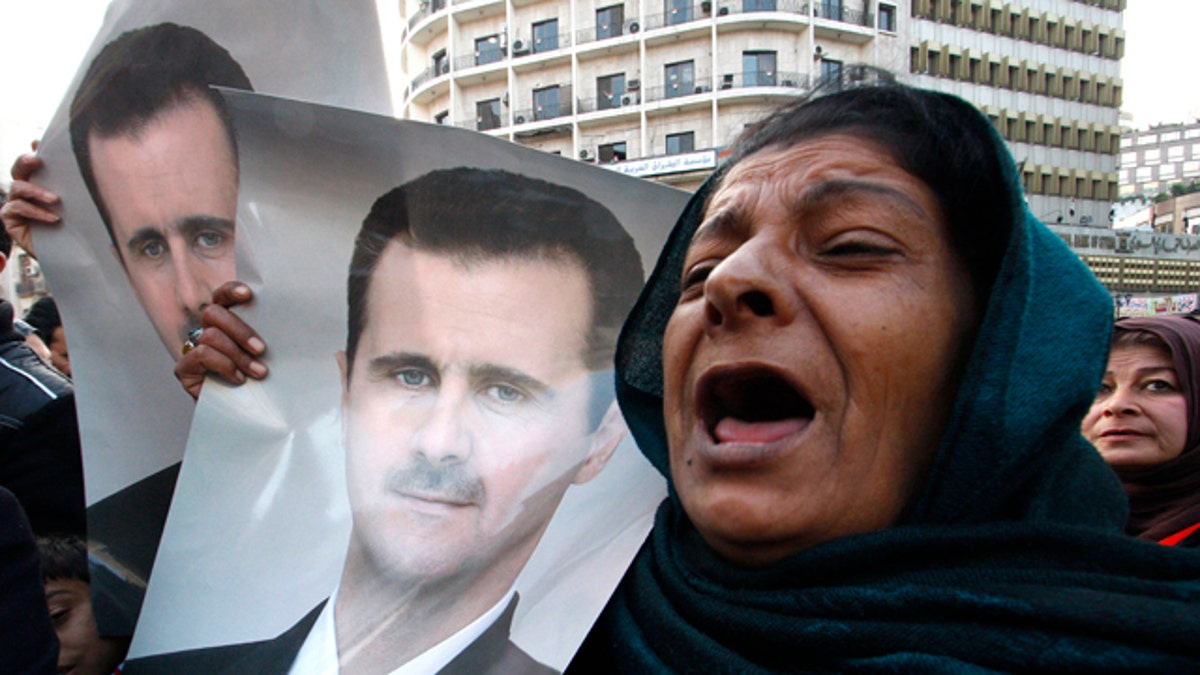
Wed. Jan 25, 2012: Pro-Syrian regime protesters, shout slogans and holds portrait of Syrian President Bashar Assad during a demonstration to show their solidarity for their president, in Damascus, Syria. Government forces clashed with army defectors and stormed rebellious districts in central Syria on Wednesday, firing mortars and deploying snipers in violence that killed at least seven people, including a mother and her 5-year-old child, activists said. (AP Photo) (AP)
BEIRUT -- Syrian troops stormed a flashpoint suburb of Damascus on Thursday, rounding people up in house-to-house raids and clashing with army defectors, activists said, as the 10-month-old uprising inches ever closer to the capital.
Even as the fighting raged in Douma, tens of thousands of backers of President Bashar Assad poured into the streets just 10 miles away in downtown Damascus in a show of support for his embattled regime.
Similar pro-regime rallies were held in other cities Thursday, even as the bloodshed continued elsewhere -- offering a sign of the deep divisions over the country's deadly revolt.
The offensive against Douma came two days after Syrian Foreign Minister Walid al-Moallem said his government will continue with the "security solution" to end the crisis. It was the latest evidence that the Assad regime was rejecting pressure to stop the bloody crackdown, and the Arab League was powerless to curb it.
Just days after pulling out of the suburb of Douma following intense clashes with anti-regime fighters, government troops pushed back in early Thursday from all directions, meeting some resistance from army defectors, activists said.
"A fierce battle is taking place, and troops are shelling areas with heavy machine gun fire," activist Mohammed al-Saeed, a Douma resident, told The Associated Press. "People are hiding in their homes as special prayers are blaring from mosques loudspeakers."
The British-based Syrian Observatory for Human Rights said at least 200 people were detained Thursday in Douma.
"They are entering homes, searching cars and stopping people in the streets to check identity cards," al-Saeed said. "There is very little movement in the streets, and nobody is allowed to leave or enter Douma."
The suburb has become a focus of tension in recent months, with large protests against Assad crushed by security forces.
The Syrian uprising began last March with largely peaceful anti-government protests, but it has grown increasingly militarized in recent months as frustrated regime opponents and army defectors arm themselves and fight back against government forces.
The government crackdown has killed more than 5,400 people since March, according to estimates from the United Nations.
Assad's regime claims terrorists acting out a foreign conspiracy are behind the uprising, not protesters seeking change, and that thousands of security forces have been killed.
After 10 months of violent conflict, the unrest has reached something of a stalemate, with many Syrians calling for change but also fearing a descent into civil war as the country's many sectarian and religious groups turn on each other.
International pressure on Damascus to end the bloodshed so far has produced few results.
The Arab League has sent observers to the country as part of a plan to the end the crisis, but the mission has been widely criticized for failing to stop the violence. Gulf states led by Saudi Arabia pulled out of the mission Tuesday, asking the U.N. Security Council to intervene because the Syrian government has not halted its crackdown.
Following the withdrawal of the Gulf state monitors, the observer mission is likely to draw to a close soon, despite Syria's extending the mission's mandate on Tuesday for another month, said the risk-analysis company Maplecroft.
"Despite the limited impact of the mission, violence is likely to increase as inspectors are withdrawn," the Britain-based group said. "Division amongst the armed resistance may also lead to a spike in attacks against regime forces as different factions attempt to assert authority through success on the battlefield."
In Cairo, Arab League chief Nabil Elaraby told reporters that he and the prime minister of Qatar would leave for New York on Saturday to brief the U.N. Security Council on the latest Arab plan to end the crisis in Syria. He said their talks, to start Monday, are designed to enlist the support of the council for the Arab peace plan.
The plan is a two-month transition to a unity government and includes Assad handing over his powers. Syria has hotly rejected it as intervention in its internal affairs.
Despite the calls from some Arab states for decisive action from the U.N., that prospect appears unlikely because Russia, a strong Syrian ally, has opposed moves like sanctions.
Violence continued unabated Thursday.
The British-based Observatory said a joint army and police force was ambushed Thursday near the town of Khirbet Ghazaleh, killing four members of the security forces and wounding five more.
It added that a sniper shot dead a woman in the central city of Hama, while a stray bullet killed a 14-year-old boy in the southern province of Daraa. The group said three people were also killed in the central province of Homs.
Syria's state-run news agency SANA said an army colonel was shot dead by "an armed terrorist" in front of his home in the central city of Homs.
Also Thursday, U.N. Secretary-General Ban Ki-moon condemned the killing of a Red Crescent official in Syria and offered condolences to the family. Attackers are said to have targeted a vehicle that Abdulrazak Jbero was riding in, which was clearly marked with the Red Crescent emblem.
Ban called on the Syrian government to investigate the crime and bring those responsible to justice.
